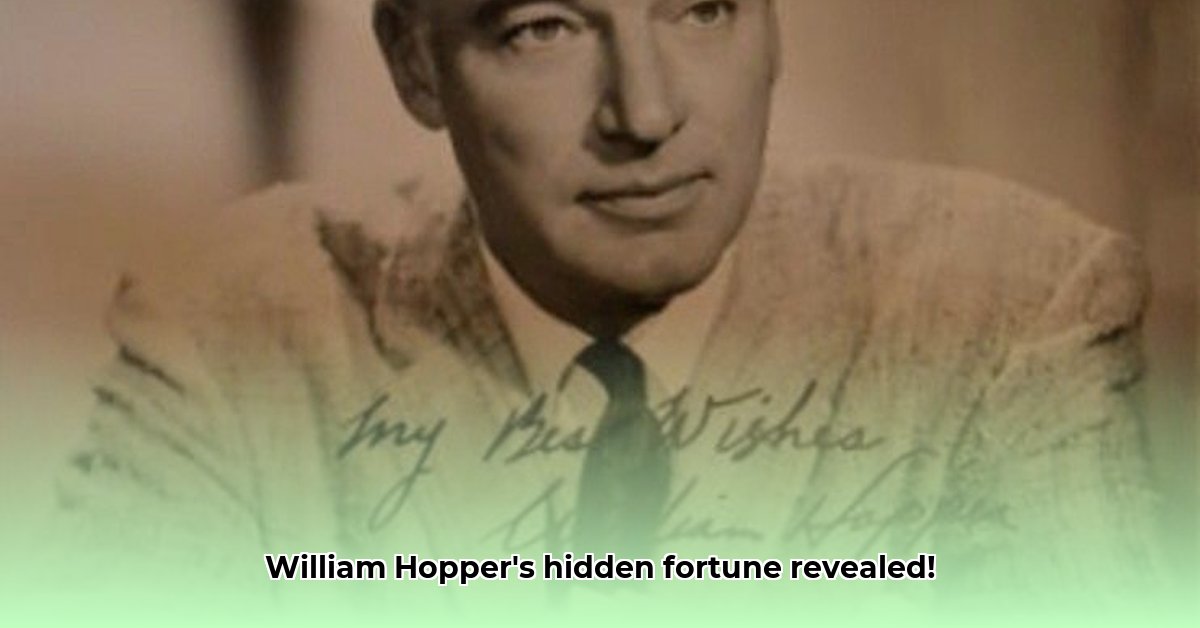
From Stage Fright to Screen Success: The Life and Times of William Hopper
The name William Hopper evokes images of classic Hollywood, a legacy further cemented by his iconic role as Paul Drake in Perry Mason. But beyond the silver screen charisma lies a compelling story of overcoming adversity, a journey from the privileged son of Hollywood royalty to a respected and enduring actor. Pinpointing his exact net worth, however, proves surprisingly elusive, a testament to the challenges of accurately assessing the financial affairs of a deceased celebrity decades later. This article explores not only the mystery surrounding Hopper's wealth but also the fascinating narrative of his life, a life that highlights resilience, talent, and the complexities of navigating a family legacy in the cutthroat world of show business. For comparison, see a similar estimate of another star's wealth here.
A Hollywood Birthright and the Shadow of Expectations
Born into a family synonymous with Hollywood glamour – his parents were the legendary Hedda and DeWolf Hopper – William Hopper inherited a unique and complex birthright. While this offered certain advantages, it also cast a long shadow. The weight of expectation, the constant comparisons to his famously outspoken mother, and the pervasive pressure to live up to his family's legacy contributed to a crippling case of stage fright that significantly hampered his early career. How did this privileged background – often associated with effortless success – ironically become a hurdle in his own climb to stardom? It's a question that underscores the complexities of his journey.
Early Roles and a Wartime Interlude: Finding His Footing
Hopper's early film career in the 1930s and 40s showcased promise, yet lacked the breakout role that would catapult him to widespread fame. World War II intervened, a defining chapter that took him far from the Hollywood spotlight. His service in the US Navy, notably with the OSS and Underwater Demolition Teams, forged discipline and resilience, characteristics that would prove invaluable in his later acting career. This period of intense service, however, also created a period of reflection and introspection, possibly contributing to a pause in his pursuit of acting after the war.
The Turning Point: Mentorship and a Resurgence
The return to Hollywood was not immediate, or easy. Overcoming the lingering effects of stage fright and the uncertainties of post-war life presented another significant hurdle. A crucial turning point arrived through the mentorship of director William Wellman. Wellman’s belief in Hopper’s potential, and his guidance, proved instrumental in rekindling Hopper's passion and belief in himself. This mentorship provided not only technical guidance but critically, renewed confidence and direction. This crucial support system propelled Hopper back into the industry with a new sense of purpose and determination.
Paul Drake and the Perry Mason Phenomenon: Defining Success
Hopper's portrayal of Paul Drake in the iconic Perry Mason series stands as a testament to his talent and perseverance. This enduring role, beloved by generations, solidified his place in television history. The role required more than just acting prowess; it demanded impeccable comedic timing, a sharp understanding of character dynamics, and a mastery of understated wit. The success of Perry Mason undeniably boosted Hopper’s profile and financial standing. How significantly, however, remains difficult to precisely quantify.
Unraveling the Net Worth Enigma: Challenges of Estimation
Estimating William Hopper's net worth poses a significant challenge. The lack of comprehensive documentation, the fluctuating value of assets over time, and the complexities of accounting for earnings across various decades all contribute to significant uncertainty. While his Perry Mason years undoubtedly brought considerable financial rewards, pinpointing a precise figure remains largely speculative. It is therefore impossible to give a definitive number beyond acknowledging a broad range of estimations cited by different sources. This lack of certainty does not diminish the value of his contribution to the entertainment world.
Beyond the Dollars: A Legacy of Talent and Resilience
While a precise net worth remains elusive, William Hopper's true worth lies in his enduring contributions to Hollywood. His story transcends simple financial metrics; it stands as a testament to resilience, to overcoming adversity, and to the enduring power of talent. His journey from overcoming stage fright to becoming a respected and beloved actor serves as a powerful example of dedication and perserverance. The legacy of his life and career far surpasses any dollar figure. The memory of his work, and the influence he had on others, are far more valuable than any financial statement ever could be. This is his lasting success.